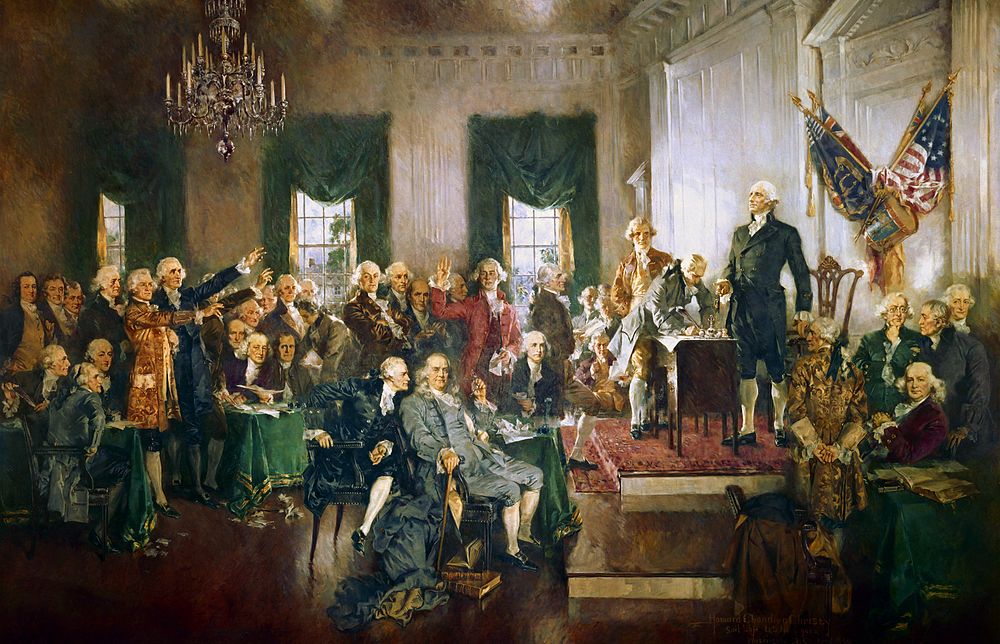The author’s certainly have a point that America must get spending under control. Is a constitutional convention the way to go? We remain skeptical, more than a little nervous even, but they raise interesting points. What do you think? CFACT -Ed
It is hopeless to spend money and effort to try to amend the Constitution by the traditional means of having amendments proposed by Congress and then ratified by the states. There have been balanced budget amendments proposed in Congress many times over the years, and they were all voted down. Our government has become so structurally corrupt that Congress will never reduce spending. It is politically impossible to elect dedicated, knowledgeable people in sufficient numbers to achieve this. Congress passed laws in 1978 and 1985 to balance the budget, but they were ineffective because Congress cannot bind future Congresses by laws. Congress can change the rules whenever it wants. It doesn’t need to go through the formality of changing a law or repealing it. All it needs to do is pass a law that doesn’t obey the law—and that then becomes the law.
What has been needed is a Constitutional amendment. Such amendments were introduced in 1982, 1986, 1990, 1994 and 1995, and Congress voted down every one of them, even the particularly toothless ones in 1994 and 1995. Congress has proven worthless as far as reducing spending. Fortunately there is another way to do this: a Constitutional Amendment through a convention of states as provided by Article V of the Constitution. Under Article V a convention of states can be called to consider amendments to the Constitution. If these are then ratified by the legislatures of three-fourths of the states, they become part of the Constitution. This procedure that has always been in the Constitution but has never been used. Now is the time to use it. There has never been a greater need for it. It’s time to put all effort into a convention of the states to propose a balanced budget and other reforms.
Unwarranted fears of such a convention are raised by claims of a “runaway” convention that might enact laws detrimental to the states and the people. But the convention cannot “enact” anything. It can only make recommendations; the power to make or alter laws remains with the legislatures.
Furthermore, simple arithmetic shows fears of a “runaway” convention by the states are completely unfounded. Here’s why. Voting at the convention will be by state, not by population or number of delegates. Big states such as New York and California will have no advantage over states such as Rhode Island or Idaho, which have very small populations. The big states, with most of the nation’s population, will not be able to create a “runaway” convention at the expense of the smaller states. For an amendment to be approved by the convention, it must have broad popular support to get the votes needed for acceptance by the convention. If that happens, the proposed amendment will then be referred to the states, where it must be passed by three-fourths of the state legislatures for it to become part of the Constitution. This, again, is a measure that will require broad popular support; no minority, no matter how powerful is going to be able to control the voting of 3/4ths of both houses of the state legislatures. This last step is a very high bar to pass—and it is exactly the same as for the other method for amendments (via Congress) as specified in our Constitution.
Also, fears that the liberal leftist progressives would get their way by dumping the Constitution we have in favor of the socialist framework they now desire would not be something to worry about. Anything the delegates might wish to remove from the Constitution could only be done by the same process as adding something new and getting it ratified by both houses of the state legislatures in 3/4ths of the states.
If a proposed amendment is passed by the state legislatures in 3/4th of the states, it then becomes part of the Constitution and receives the same enforcement and protection as the rest of the Constitution. And it is highly unlikely anything good will being eliminated and a zero chance of a totally new Constitution being imposed. With equal say among the 50 states the leftist majorities of New York and California can not create a tyranny that a democracy always threatens. Happily we are not a democracy but rather a Constitutional Republic. Without the approval of three-fourths of the states—which cannot realistically happen as long as there is a functional federal government—we have nothing to fear.
Once a convention of states begins, it is impossible to limit its scope; it is not limited to just the originally proposed amendments; however, any new amendments must pass the same standard of votes by the convention delegates and then be ratified by ¾ of the state legislatures. Obviously this is a tall order but it carries no fear that that there could ever be a socialist take over, while clearly most of those running for the Democratic nomination for our Presidency would like that to happen. It is also clear that the vast majority of Americans would not allow it. They easily control the ability of 3/4th of the States to prevent such devastation.
